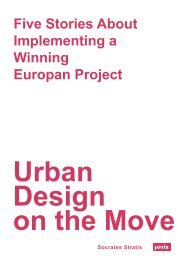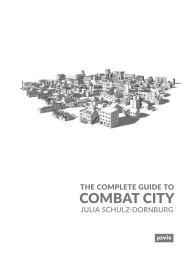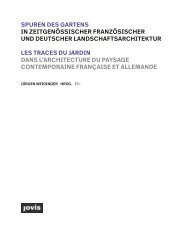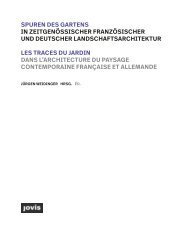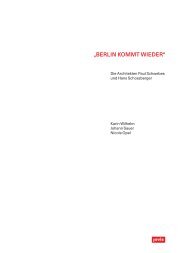Urban Asias – Essays on Futurity Past and Present
Create successful ePaper yourself
Turn your PDF publications into a flip-book with our unique Google optimized e-Paper software.
65<br />
6<br />
Envisi<strong>on</strong>ing Future<br />
<strong>Past</strong>s<br />
Heritage <strong>and</strong> Emergent Activism in<br />
Postcol<strong>on</strong>ial Macau <strong>and</strong> H<strong>on</strong>g K<strong>on</strong>g<br />
Cecilia L. Chu<br />
Over the past decade, the protecti<strong>on</strong> of historic buildings <strong>and</strong> l<strong>and</strong>scapes<br />
has been a major issue preoccupying states <strong>and</strong> civil societies in Asia.<br />
Governments, businesses <strong>and</strong> NGOs across the regi<strong>on</strong> have engaged with<br />
heritage c<strong>on</strong>servati<strong>on</strong> to achieve a multitude of purposes. The most notable<br />
is the promoti<strong>on</strong> of tourism, where investment in heritage assets <strong>and</strong> turning<br />
them into cultural capital has become key to city br<strong>and</strong>ing <strong>and</strong> urban<br />
revitalizati<strong>on</strong>. At the same time, heritage activities have also proved to be<br />
effective in strengthening nati<strong>on</strong>al pride <strong>and</strong> community empowerment.<br />
This is especially apparent in places that have gained recogniti<strong>on</strong> from internati<strong>on</strong>al<br />
heritage organizati<strong>on</strong>s such as UNESCO. In many cities, the promoti<strong>on</strong><br />
of heritage to the outside world often goes in t<strong>and</strong>em with a surge<br />
of interest am<strong>on</strong>g citizens in revisiting their own histories <strong>and</strong> preserving<br />
local cultures. These phenomena point to an emergent “heritage paradigm”<br />
in Asia, where the shaping of local identities <strong>and</strong> ec<strong>on</strong>omies are becoming<br />
increasingly c<strong>on</strong>nected to the accelerating globalizati<strong>on</strong> of heritage <strong>and</strong><br />
cultures.1<br />
There is by now a significant amount of critical writing that discusses<br />
heritage making as part <strong>and</strong> parcel of globalizing capitalism <strong>and</strong> its<br />
role in the <strong>on</strong>going commodificati<strong>on</strong> of the envir<strong>on</strong>ment. 2 The emphasis <strong>on</strong><br />
adding ec<strong>on</strong>omic value to cultural assets suggests that c<strong>on</strong>servati<strong>on</strong> practice<br />
is becoming more aligned with a neoliberal model of business management,<br />
where the evaluati<strong>on</strong> of heritage is increasingly carried out according to various<br />
sets of calculable impacts <strong>and</strong> cost-benefits. 3 At the same time, there is<br />
a gradual shift in the resp<strong>on</strong>sibility for heritage protecti<strong>on</strong> from the state to







